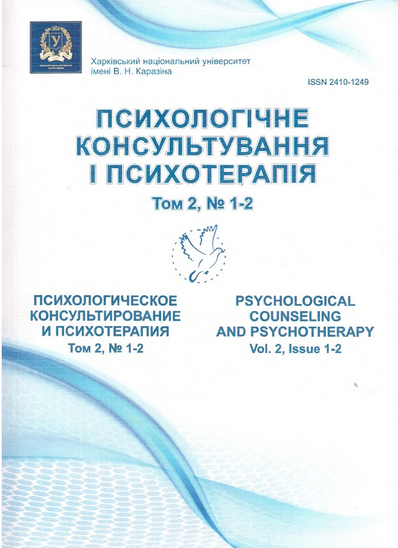UNDERSTANDING FOCUSING-ORIENTED PSYCHOTHERAPY
Анотація
Ця стаття описує уміння сфокусовано-орієнтованої психотерапії. Юджин Джендлін першим сформулював теорію переживання, і інтеграцію фокусування в психотерапевтичної практиці. Основні методи фокусировано-орієнтованої психотерапії описані і введені в міжособистісному контексті терапії. Стаття включає в себе список літератури для ознайомлення: теорія практика застосування фокусировано-орієнтованої психотерапії.
Ключові слова: фокусировано-орієнтована психотерапія, психотерапія, психотерапевтична практиці, особистість, felt досвід, felt почуття.
Завантаження
Посилання
Friedman, N. (1982) Experiential therapy and focusing. New York: Half Court Press.
Friedman, N. (2004). Eugene Gendlin’s approach to psychotherapy: An awareness of ‘experiencing’. www.americanpsychotherapy.com Annals Spring, 23-25.
Friedman, N. (2005). Experiential listening. Journal of Humanistic Psychology Vol. 45 No. 2, Spring 217-238
Gendlin, E.T. (1961). Experiencing: A variable in the process of therapeutic change. American Journal of Psychotherapy, 15(2).
Gendlin, E.T. (1963). Subverbal communication and therapist expressivity. Journal of Existential Psychiatry 4, 105.
Gendlin, E.T. A theory of personality change. in Philip Worchel and Donn Byrne (Eds.), Personality Change. NY: John Wiley & Sons, 1964, 100-148.
Gendlin, E.T. (1968). The experiential response. In Hammer (Ed.), The use of interpretation in treatment. New York: Grune and Stratton, Inc.
Gendlin, E.T. (1977). Experiential focusing and the problem of getting movement in psychotherapy. In D. Nevill (Ed.), Humanistic psychology: New frontiers, pp. 117-132. New York: Gardner Press.
Gendlin, E.T. (1977) The Experiential Response. In Hammer, E.F. Use of Interpretation in Treatment: Technique and Art. New York: Grune and Stratton, Inc.
Gendlin, E.T. (1981). Focusing. New York: Bantam Books. See also www.focusing.org/Learn Focusing
Gendlin, E.T. (1984). The client’s client: The edge of awareness. In R.L. Levant & J.M. Shlien (Eds.), Client-centered therapy and the person-centered approach. New directions in theory, research and practice, New York : Praeger.
Gendlin, E.T. (1996). Focusing-Oriented Psychotherapy: A Manual of the Experiential Method. New York: Guilford Press.
Gendlin, E.T. (1997). Experiencing and the Creation of Meaning. Evanston, IL: Northwestern University Press. (Originally published Glencoe IL: The Free Press,1962)
Gendlin, E.T. (2009). We can think with the implicit, as well as with fully formed concepts. In Karl Leidlmair (Ed.), After cognitivism: A reassessment of cognitive science and philosophy. Springer. pp. 147-161. (see also: www.focusing.org /How to think at the edge).
Gendlin, E.T. (2012). Implicit precision. In Z. Radman (Ed.), Knowing without thinking: The theory of the background in philosophy of mind, Basingstoke: Palgrave Macmillan (2012)Hart, J. (1970). The development of client-centered therapy. In J. Hart, & T. Tomlinson, New Developments in Client-Centered Therapy (pp. 3-22). Boston: Houghton-Mifflin.
Ikemi, A. (2011). Empowering the implicitly functioning relationship. Person Centered & Experiential Psychotherapies, 10 (1): 28-42
Ikemi, A. (2014). A theory of focusing=oriented therapy. In G. Madison (Ed.) Theory and practice of focusing-oriented psychotherapy: Beyond the talking cure. Jessica Kingsley Publishers: London and Philadelphia.
Klein, M. H., Mathieu, P.L. Gendlin, E.T., & Kiesler, D.J. The experiencing scale: A research and training manual. Madison, WI: University of Wisconsin Extension Bureau of Audiovisual Instruction, 1969.
Klein, M.H., Mathieu-Coughlin, P.L., & Kiesler, D.J. The experiencing scales. In L.S. Greenberg & W. Pinsof (Eds.), The psychotherapeutic process: A Research Handbook. NY: Guilford, 1986, pp.21-71.
McGuire, K. (1996) Focusing therapy, theory, research, practice and training. The Folio: A Journal For Focusing and Experiential Therapy, Vol. 15, No. 1.
Preston, L. (2005) Two interwoven miracles: The relational dimension of focusing-oriented therapy. Available at: http://www.lynnprestonforp.com/articles
Preston, L. (2005). The relational heart of focusing-oriented psychotherapy. . Available at: http://www.lynnprestonforp.com/articles
Preston, L. (2008). The edge of awareness: Gendlin's contribution to explorations of implicit experience. International Journal of Psychoanalytic Self Psychology, 3(4)
Rogers, C. (Ed.). The therapeutic relationship and its impact: A program of research in psychotherapy with schizophrenics. Madison, WI: University of Wisconsin Press, 1967.








